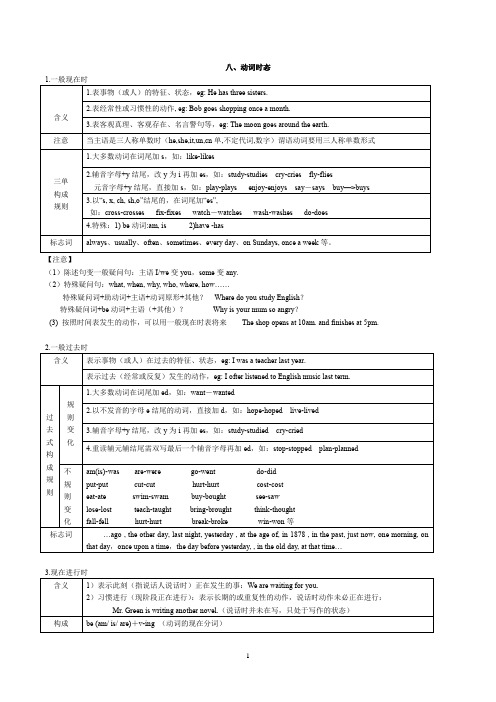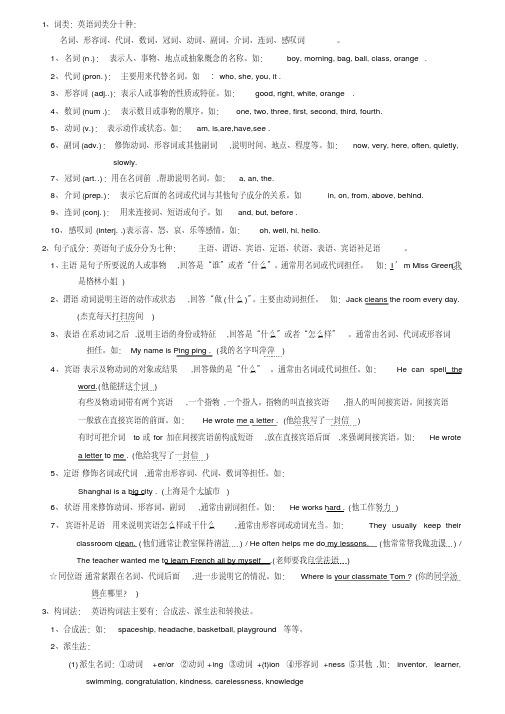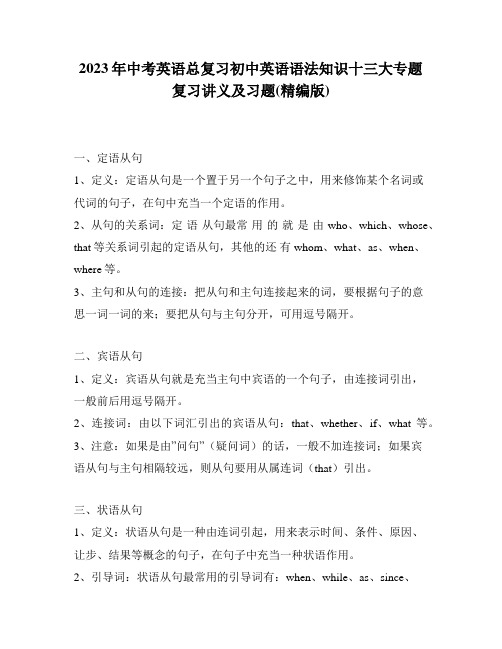中考英语语法总复习
中考英语语法总复习短语、词组归纳、重点句型

[短语、词组归纳]由动词开头构成的短语、词组很多。
复习时应分类处理:一、动词+介词1.look at…看…,look like … 看上去像……,look after …照料…2.listen to…听……3.welcome to…欢迎到……4.say hello to …向……问好5.speak to…对……说话此类短语相当于及物动词,其后必须带宾语,但宾语无论是名词还是代词,都要放在介词之后。
二、动词+副词“动词+副词”所构成的短语义分为两类:A.动词(vt.)+副词1.put on 穿上2.take off脱下3.write down记下此类短语可以带宾语,宾语若是名词,放在副词前后皆可;宾语若是人称代词,只能放在副词的前面。
B.动词(vi)+副词。
1.come on赶快2.get up起床3.go home回家4.come in进来5.sit down坐下6.stand up起立此类短语属于不及物动词,不可以带宾语。
三、其它类动词词组1.close the door2.1ook the same3.go to work/class4.be ill5.have a look/seat6.have supper7.1ook young 8.go shopping 9.watch TV/games10. play games[介词短语聚焦]“介词+名词/代词”所构成的短语称为介词短语。
现将Unitsl-16常用的介词短语按用法进行归类。
1.in+语言/颜色/衣帽等,表示使用某种语言或穿着……。
2.in + Row/ Team/ Class/ Grade等,表示“在……排/队/班级/年级”等。
3.in the morning/ afternoon/ evening/ 表示“在上午/下午/傍晚”等一段时间。
4.in the desk/ pencil-box/bedroom 等表示“在书桌/铅笔盒/卧室里”。
中考英语语法总复习讲义【珍藏版】

中考英语语法总复习讲义专题一名词名词是中考考查的重点。
考查内容主要为:Ⅰ.名词的定义名词是表示人、事物、现象和其他抽象概念的名称的词。
名词可分为专有名词和普通名词。
专有名词是具体的人和事物等特有名称。
专有名词的第一个字母要大写,人名、地名、公共节日及月份、周日的名称等等都是属于专有名词。
如:Yao Ming 姚明;China 中国;Christmas 圣诞节等。
Ⅱ. 可数名词和不可数名词普通名词按照其所表示的事物的性质分为可数名词和不可数名词。
1.可数名词可数名词有单数和复数两种形式。
如:an apple; two apples 。
★注意:a 用于以辅音音素( 指音标) 开头的单数名词前;an 用于以元音音素( 指音标) 开头的单数名词前。
如:a book/buk/, a useful/ju:sful/ book ,an apple/’aepl/ ,a red apple , an hour/’aua/2.不可数名词: 不可数名词包括物质名词和抽象名词,没有复数形式。
(1)物质名词。
如:water; rice; tea; milk; food; fruit; meat; fish(鱼肉); chicken(鸡肉); beef; mutton; orange(橙汁);sugar; salt; paper(纸); porridge; bread; sand; juice等。
这类不可数名词需要计量时要在名词前加表示量的词。
如:a cup of tea; two bags of rice; three bottles of water等。
(2)抽象名词。
如:news; music; time(时间); information等。
(3)不可数名词不能与数词或不定冠词连用。
(4)注意有些名词既可做可数名词也可做不可数名词。
如:fish; time; glass; orange; room; noise; chicken等。
中考英语语法总复习(精华版)

中考英语语法总复习(精华版)Ⅰ词类。
专有名词:表示人名、月份、日期、地名等。
如China, John, London, the USA, Harbin .个体名词:表示单个的人或事物。
如boat, chair, desk, apple .集体名词:表示一群人或一些事物的总称。
如family, people, class, police . 可数名词普通名词物质名词:表示无法分为个体的物质。
如water, air, tea, sea, money, cotton .抽象名词:表示抽象概念的词。
如health, help, work, friendship . 不可数名词 2.名词的数。
可数名词有单复数,不可数名词没有单复数。
3.名词的格:名词有三个格:主格(作主语)、宾格(作宾语)、和所有格。
其中只有名词的所有格有形式变化。
(二)冠词1.定冠词-the .○1特指某(些)人或某(些)事物。
The students are very good.○2说话人与听话人都知道的人或事物。
Where is the toilet ?○3重复提到上文的人或事物。
I have a cat , the cat is white and black .○4表示世界上独一无二的事物。
The moon moves around the earth .○5形容词最高级和序数词前和表示方位的名词前。
I am the oldest . He is the first to school . I live in the south .○6乐器的名称前常用定冠词-the 。
I like playing the piano / violin .○7和某些形容词连用,使形容词名词化,代表某一类人。
We should help the poor .○8放在某些专有名词前。
We will go to visit the Great Wall next week . the people’s Republic of China .○9放在姓氏的复数形式前,表示全家人或夫妇两人。
2023年英语中考语法总复习—8.动词时态和语态

八、动词时态【注意】(1)陈述句变一般疑问句:主语I/we变you,some变any.(2)特殊疑问句:what, when, why, who, where, how……特殊疑问词+助动词+主语+动词原形+其他?Where do you study English?特殊疑问词+be动词+主语(+其他)?Why is your mum so angry?(3) 按照时间表发生的动作,可以用一般现在时表将来The shop opens at 10am. and finishes at 5pm.【注意】(1)always也可用于现在进行时,表示一种强烈的感情色彩,译为“总是”He is always telling lies.(2)某些特殊动词不能用于现在进行时。
① have当“有”讲时,不能用现在进行时。
I have two books now.②“belong to” The two people belong to me now.③表示“心理活动/状态/感觉”的词I want a dog now.① be going to主要用于:主观判断(1)表示事先经过考虑、安排好打算要做的事情:I’m going to play the violin.(2)表示根据目前某种迹象判断,某事非常有可能发生(有迹象表明要发生的事)。
Look!There come the dark clouds. It is going to rain.② will主要用于:(1)客观上将来势必发生的事情, 未经事先考虑, 临时决定的They will go to visit the factory tomorrow.(2)表示不以人的意志为转移的自然发展的未来的事:Today is Saturday. Tomorrow will be Sunday.(3)表意愿。
问对方是否愿意做某事或表示客气地邀请或命令:Will you please turn on the radio?(1) have/has been to “去过已回”She has been to Japan twice.have/has gone to. “去了未回”Where is your twin sister? She has gone to Japan.have/has been in “待在某地” She has been in Japan for 2 years. (2) 动词从词义上可以分为延续性和非延续性两种。
初中英语语法中考总复习讲解

1、词类:英语词类分十种:名词、形容词、代词、数词、冠词、动词、副词、介词、连词、感叹词。
1、名词(n.):表示人、事物、地点或抽象概念的名称。
如:boy, morning, bag, ball, class, orange.2、代词(pron.):主要用来代替名词。
如:who, she, you, it .3、形容词(adj..):表示人或事物的性质或特征。
如:good, right, white, orange .4、数词(num.):表示数目或事物的顺序。
如:one, two, three, first, second, third, fourth.5、动词(v.):表示动作或状态。
如:am, is,are,have,see .6、副词(adv.):修饰动词、形容词或其他副词,说明时间、地点、程度等。
如:now, very, here, often, quietly,slowly.7、冠词(art..):用在名词前,帮助说明名词。
如:a, an, the.8、介词(prep.):表示它后面的名词或代词与其他句子成分的关系。
如in, on, from, above, behind.9、连词(conj.):用来连接词、短语或句子。
如and, but, before .10、感叹词(interj..)表示喜、怒、哀、乐等感情。
如:oh, well, hi, hello.2、句子成分:英语句子成分分为七种:主语、谓语、宾语、定语、状语、表语、宾语补足语。
1、主语是句子所要说的人或事物,回答是“谁”或者“什么”。
通常用名词或代词担任。
如:I’m Miss Green.(我是格林小姐)2、谓语动词说明主语的动作或状态,回答“做(什么)”。
主要由动词担任。
如:Jack cleans the room every day.(杰克每天打扫房间)3、表语在系动词之后,说明主语的身份或特征,回答是“什么”或者“怎么样”。
初中英语中考语法总复习专题(提优版)

初中英语中考语法总复习专题(提优版)一、选择题1.Our parents won't allow us _____ in the river alone.A.swimB.to swimC.swimmingD.swam2.My bike is broken. I will have it________ tomorrow morning.A.fix up B.fixed up C.repairing D.to repair 3.The joke was so funny that it made him ________ again and again.A.laughing B.laughed C.laugh D.to laugh 4.The way our students thought of ________ the classroom clean and tidy proved to be very useful.A.to keep B.keeping C.kept D.keeps5.The examination is coming. What else should we pay attention to ________our grades? A.to improve B.improving C.improve D.improved 6.—Why do the students need to read every day?—________information for writing.A.To collect B.Collecting C.Collect D.Collected 7.Online short video apps like Douyin make________easier to do some shopping at home. A.it B.one C.this D.that8.As a teacher, I chose those classical songs I listened to ________ my students these days. A.relax B.relaxing C.to relax D.relaxed 9.Sallie rolls up her new trousers carefully _____ them from dust.A.protect B.protecting C.to protect D.to protecting 10.—I didn’t hear you come in just now.—That’s great. I tried ________ the baby up.A.no waking B.don’t wake C.to not wake D.not to wake 11.—Why are you so excited today?—Because we were told a school trip this weekend.A.having B.have C.to have D.had12.---Max is a funny boy. His jokes always make us ________a lot.A.to laugh B.laughing C.laugh D.laughs13.I was tired out, so I stopped the car a short rest.A.have B.having C.to have D.had14.The computer requires ________. I think I need ________ to ask Mr. Zhang for help. A.fixing, to go B.to fix, going C.fixing, going D.to fix, to go 15.–Your robot has caught a virus and it no longer works properly.–Wow, ______ mess it has ma de! I really don’t know _______ to do with it.A.what, how B.how, how C.what a, what D.how, what16.—I hope to take the DIY course at weekends.—Good idea. ________ more about it, visit the website http://www. . please. A.Know B.To know C.Knowing D.To knowing 17.China now has many good chances for people returning from abroad their dreams. A.achieve B.achieved C.to achieve D.achieving18.―What do you think of the action movie Mulan?―It comes from an old Chinese story. Mulan dresses up as a boy and takes her father's place in the army.A.to fight B.fighting C.fights D.fought 19.—Look at the sign! You aren’t allowed _______ in public places.—Sorry, I didn’t see it.A.smoke B.smoking C.to smoke D.smoked 20.When you are home, give a call ___________ me know you have arrived safely.A.let B.to let C.letting D.be let21.一Have you got the tickets for the concert?一Not yet,I didn't realize difficult it was the tickets.A.what; to get B.what; getting C.how; to get D.how; getting22.There ______ a group of people _______on the beach.A.is, lying B.are, lying C.have, laid D.has,lie23.___________for his good skill, this doctor has a lot of visitors calling for help all the time. A.Knowing B.To know C.Known D.To have known 24.He tried to make himself ________ by his students, but he failed.A.understand B.understoodC.understands D.understanding25.My younger sister wants to get her ears ________ after graduation.A.pierced B.pierce C.piercing D.to pierce 26.—My eyesight is getting worse these days. I'd like to have my eyes________. —Perhaps you should consider ________the time on the computer.A.checked; reducing B.to check; reducingC.checked; to reduce D.checking; to reduce27.The music ________ by Mozart is well known ________ people all over the world. A.writes; as B.written; for C.written; as D.written; to 28.Mrs. White showed her student some old maps ________from the library.A.to borrow B.to be borrowed C.borrowed D.borrowing 29.Most of the artists____________ to the party were from South Africa.A.invite B.to invite C.invited D.inviting30.—I don’t know _____ remember the new English words.—Don’t worry! Try thinking about their pronunciations.A.what to B.how to C.where to D.when to 31.These young trees will require ________carefully.A.to look after B.being looked after C.having looked after D. looking after 32.Snakes don’t have ears but they can feel things ________.A.moving B.move C.moved D.to move 33.When Tom saw his mother ______ for him on a col d winter night, he couldn’t keep back his tears.A.wait B.waited C.to wait D.waiting 34.—What are you talking about?—Some pictures ________ yesterday.A.were taken B.took C.taken D.have been taken 35.—Tom, have you ever read the book A Tale of Two Cities ________ by Charles Dickens?—Yes, I finished reading it last winter vacation.A.wrote B.to write C.writing D.written 36.—What terrible weather!I simply can’t get the car________.—Why not try________the engine with some hot water?A.started; filling B.to start; filling C.started; to fill D.to start; to fill 37.A woman was found ________ in her house this morning. The police said she was wounded with a knife and bled to ________.A.died; death B.death; dead C.dead; death D.death; death 38.This food is cooked by a cook _____ Victor.A.call B.calls C.called D.calling39.Your hair is too long. You’d better _____.A.have it cut B.have cut it C.be cutting it D.to cut it40.________with his flat, mine looks__________ new.A.Compared; as good as B.To compare; as well as C.Compared; as well as D.To compare; as good as41.I think middle school students should not get their hair _______.A.color B.colors C.colored D.coloring42.I would rather spend time ______ at home than ______ out with you.A.staying; go B.to stay; to go C.staying; to go D.to stay; go43.The details the teachers asks to pay attention to ________ our English are very important. A.to improve B.improve C.improving D.improved 44.When I eat a mooncake, I prefer ________ it into small pieces before eating rather than________ it up straight.A.to cut;eat B.cutting;eat C.to cut;to eat D.cutting;eating 45.The girl is so helpful that she devoted all her spare time she had ________ others.A.to helping B.helping C.to help D.helped46._________ with Huawei and Xiaomi, Apple seems to have lost its attraction in the past few months.A.Comparing B.Compared C.Connecting D.Connected47.In spring, a mask can be helpful if flowers make your nose uncomfortable.A.wear B.wore C.wearing D.worn 48.Thousands of young people spend hours ______ Wechat moments of their friends every day. A.to check B.checking C.check D.checks49.We often see young couples go________ with their dogs along the lakeside paths at the weekend.A.jogging B.boating C.skiing D.swimming50._____ a GPS will make _______ easier for everyone to visit a strange place.A.Take, her B.Taking, that C.Taking, it D.Take, this51.I like ___________ because it makes us know ourselves better and know more about the world.A.reading B.read C.to read D.reads52.--Would you mind basketball here? I'm writing a report.--Sorry. We'll go and play it on the playground.A.playing B.not playing C.to play D.not to play53.My father often ________ 15 minutes ________ newspaper every night.A.spend;read B.spend; reading C.spends;reads D.spends; reading 54.—Did everyone attend the concert last night?—No, Emily preferred ________ TV at home to ________ the concert.A.to watch; attend B.to watch; attending C.watching; attend D.watching; attending 55.—Anyone shouldn’t _________ use fire outdoors.—Yeah, and we should pay attention to ________ our forests and grasslands.A.be allowed to; protect B.allow to; protectingC.be allowed to; protecting D.allow to; protected56.Peter enjoys ________ pictures in the country on Sundays.A.draw B.drawing C.to draw D.drew57._______ trees is a long-term project. Let's take good care of these trees we plant and wait for them to grow up.A.Plants B.Planted C.Plant D.Planting 58.Your English will be better if you practice _______ English for an hour every day. A.speak B.speaking C.to speak D.to speaking 59._______ up sales, many international companies plan to set up online shops.A.Push B.To push C.Pushing D.Having pushed 60.People are advised to avoid ________ their eyes, nose, and mouth with unwashed hands. A.touch B.touched C.to touch D.touching【参考答案】一、选择题1.B解析:B【详解】句意:我们的父母不允许我们单独去河里游泳。
2023年中考英语总复习初中英语语法知识十三大专题复习讲义及习题(精编版)

2023年中考英语总复习初中英语语法知识十三大专题复习讲义及习题(精编版)一、定语从句1、定义:定语从句是一个置于另一个句子之中,用来修饰某个名词或代词的句子,在句中充当一个定语的作用。
2、从句的关系词:定语从句最常用的就是由 who、which、whose、that等关系词引起的定语从句,其他的还有 whom、what、as、when、where等。
3、主句和从句的连接:把从句和主句连接起来的词,要根据句子的意思一词一词的来;要把从句与主句分开,可用逗号隔开。
二、宾语从句1、定义:宾语从句就是充当主句中宾语的一个句子,由连接词引出,一般前后用逗号隔开。
2、连接词:由以下词汇引出的宾语从句:that、whether、if、what等。
3、注意:如果是由”问句”(疑问词)的话,一般不加连接词;如果宾语从句与主句相隔较远,则从句要用从属连词(that)引出。
三、状语从句1、定义:状语从句是一种由连词引起,用来表示时间、条件、原因、让步、结果等概念的句子,在句子中充当一种状语作用。
2、引导词:状语从句最常用的引导词有:when、while、as、since、until、before、after、if、whether、because等。
3、务必注意:时间、地点、条件状语从句切忌混淆,要分清才可正确运用。
四、名词性从句1、定义:名词性从句又称为词性的从句,是一个句子充当主句中的一个名词,它可单独作句子的主语,宾语或表语。
2、从句的连接词:要表达名词性从句的概念,最常采用的就是由关系代词(who, whom, which, that等)、关系副词(when, where, why, how 等)以及由从属连词(if, whether等)引起的名词性从句。
3、注意事项:将其从名词性从句区分开来可用逗号隔开;也要注意主句和从句之间的位置关系,情况不同,连接词可以不同。
五、简单句1、定义:简单句也叫单个句子,是由一个主语和一个谓语动词构成的一句话;当主语是第一人称或三单时,句尾不加to。
2023年英语中考语法总复习—10.非谓语动词

十、非谓语动词构成:(to) + 动词原形动词不定式作用:作除谓语外的任何成分构成:v.-ed(规则动词)动词的非谓语形式过去分词作用:表、定、状、补构成:v.-ing动名词作用:主、宾、表、定一、动词不定式1. 不定式的构成动词不定式的基本形式:(to) + do, 其否定形式为:not + (to) do。
3. 不定式的特殊用法①常接"疑问词+带to的不定式"的动词有teach, show, tell, learn, find out, decide, know, forget等。
►My mother taught me how to cook yesterday. 昨天我妈妈教我如何做饭②使役动词和感官动词后跟动词不定式作宾语补足语,须省略to。
此类动词有:一感(feel)、二听(hear, listen to)、三让(let, make, have)、四看(look at, see, watch, notice)、五帮(help)。
变为被动语态时,省略的to 则要加上。
③常见的动词不定式句型:1)It takes sb. + some time + to do sth. 意为:做某事花费某人多长时间。
2)It’s + sb’s +名词+ to do sth. 意为:做某事是某人的……3)It’s +形容词+ (for/of sb) + to do sth. 意为:某人做某事是……注意:当形容词为kind, careless, clever, wise, foolish, honest, lazy, kind, silly, stupid等描述人的品质和特点的词时,应选择介词of,其他情况选择for。
④常见的一些不带to的动词不定式:Why not do …? Why don’t you do …? had better(not) do …, would rather do…, Could/Will/Would you please do …? 例如:I would rather stay in the room. 我宁愿呆在家里。
- 1、下载文档前请自行甄别文档内容的完整性,平台不提供额外的编辑、内容补充、找答案等附加服务。
- 2、"仅部分预览"的文档,不可在线预览部分如存在完整性等问题,可反馈申请退款(可完整预览的文档不适用该条件!)。
- 3、如文档侵犯您的权益,请联系客服反馈,我们会尽快为您处理(人工客服工作时间:9:00-18:30)。
中考英语语法总复习
Ⅰ词类。
词类英语名称意义例词
名词The Noun (缩写为n) 表示人或事物的名称Basket, mouth, hospital, year, train
冠词The Article (art) 用在名词前帮助说明名词所指的人或事物a, an, the
代词The Pronoun (pron) 用来代替名词、形容词或数词They, his, him, mine, which, all
形容词The Adjective (adj) 用以修饰名词,表示人或事物的特征Long, empty, heavy, different, cheap, hungry
数词The Numeral (num) 表示数量或顺序Three, thirteen, twenty, second
动词The Verb (v) 表示动作或状态Hear, write, swim, eat, borrow, sing
副词The Adverb (adv) 修饰动词、形容词或其他副词Quickly, early, out, soon, then, sometimes
介词The Preposition (prep) 表示名词、代词等和句中其他词的关系From, with, at, into, behind, between, for
连词The Conjunction (conj) 用来连接词与词、短语与短语或句与句And, or, but, so, because 感叹词The Interjection (interj) 表示说话时的喜悦、惊讶等情感Oh, hey, ouch, well, there, dear
(一)名词:
专有名词:表示人名、月份、日期、地名等。
如China, John, London, the USA, Harbin .
个体名词:表示单个的人或事物。
如boat, chair, desk, apple .
集体名词:表示一群人或一些事物的总称。
如family, people, class, police . 可数名词
普通名词物质名词:表示无法分为个体的物质。
如water, air, tea, sea, money, cotton .
抽象名词:表示抽象概念的词。
如health, help, work, friendship . 不可数名词
2.名词的数。
可数名词有单复数,不可数名词没有单复数。
X| k |B| 1 . c|O |m
3.名词的格:名词有三个格:主格(作主语)、宾格(作宾语)、和所有格。
其中只有名词的所有格有形式变化。
(二)冠词
1.定冠词-the .
○1 特指某(些)人或某(些)事物。
The students are very good.
○2 说话人与听话人都知道的人或事物。
Where is the toilet ?
○3 重复提到上文的人或事物。
I have a cat , the cat is white and black .
○4 表示世界上独一无二的事物。
The moon moves around the earth .
○5 形容词最高级和序数词前和表示方位的名词前。
I am the oldest . He is the first to school . I live in the south .
○6 乐器的名称前常用定冠词-the 。
I like playing the piano / violin .
○7 和某些形容词连用,使形容词名词化,代表某一类人。
We should help the poor .
○8 放在某些专有名词前。
We will go to visit the Great Wall next week . the people’s Republic of China .
○9 放在姓氏的复数形式前,表示全家人或夫妇两人。
The Whites are watching
TV .
○10 固定词组中。
In the morning / afternoon / evening .
2.不定冠词-a / an .
○1 指人或事物的某一种类。
A horse is a useful animal. A table has four legs.
○2 指某一类人或事物中的任何一个。
Pass me a pencil, please. We write with a pen.
○3 指某人或某物,但不具体说明何人或何物。
The book was written by a peasant. Last month we were working in a factory.
○4 不定冠词还可以指“事物的单位”,如“每日”、“每斤”等。
Here is a letter for you . The meat is 18 yuan a kilo.
3.零冠词。
○1 泛指人类或男女。
Man will conquer nature .
○2 抽象名词在用来表示它的一般概念时,通常不加冠词。
Knowledge begins with practice .
○3 有些个体名词有时可以转化成具有抽象意义,其前面也常不加冠词。
We had better send him to hospital at once.
○4 在专有名词前一般不用冠词。
China is a great country. Mr Smith is an artist.
○5 在三餐饭何球类运动名称之前不用冠词。
He often goes out for a walk after supper. Sometimes I play basketball.
○6 在节假日、星期几、月份、季节等名词前。
October 10th is Teachers’Day.
○7 称呼语或表示头衔、职务的名词前不用冠词。
Granny is sleeping now. We call him monitor.
○8 在语言名词前,名词前有指示代词、物主代词或数词时,不用冠词。
This is his book. I can speak English .
○9 不用冠词的惯用语。
At night / on food / go to town / at home / in class / at work 等。
